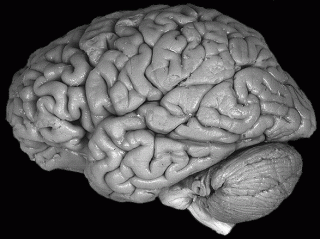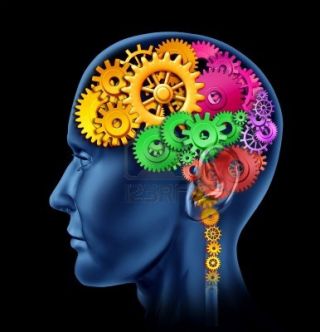Memory
What Is the Best Way to Improve Your Brain Power for Life?
4 daily habits that can boost your brainpower for a lifespan.
Posted January 21, 2014

The human brain does not automatically go into a steady decline as we age. A variety of new studies have found that simple lifestyle choices can help to keep your mind sharp throughout a lifespan. A January 2014 study from Germany found that the aging brain may work ‘slower’ as we age, but that cognitive abilities do not necessarily decline as we age.
The German researchers believe that the older brain has the potential to progressively hold more and more knowledge, and wisdom, with age. The progressive increase of data may cause the older brain to process all the information a bit more slowly, but ultimately continue to become more intelligent with age.
A University of California San Francisco study from 2009 titled, “Staying Sharp: New Study Uncovers How People Maintain Cognitive Function In Old Age” also found that cognitive function doesn’t always decline with age. The researchers examined what factors made the people whose cognition stayed sharp different from those who lost some of their abilities over eight years.
"Some of these factors such as exercise and smoking are behaviors that people can change. Discovering factors associated with cognitive maintenance may be very useful in prevention strategies that guard against or slow the onset of dementia," Alexandra Fiocco, PhD, of UCSF said. "These results will also help us understand the mechanisms that are involved in successful aging."
Over the years of researching for The Athlete’s Way I have come up with four simple ways to boost brain power for your lifetime.
4 Simple Ways to Boost Brain Power for Life
- Aerobic Exercise: People who exercise moderately to vigorously just once a week are 30 percent more likely to maintain their cognitive function than those who do not exercise at all.
- Cognitive Training: Memory, reasoning, and speed-of-processing exercises create a winning combo for cognition.
- Don't Smoke: Non-Smokers are nearly twice as likely to stay sharp in old age as those who smoke.
- Maintain Social Networks: People working, volunteering and maintaining close-knit human bonds are 24 percent more likely to maintain cognitive function in late life.

Aerobic Exercise Is the No. 1 Way to Boost Brain Power
A study from December 2012 confirmed, yet again, that aerobic exercise dramatically improves aspects of cognitive function such as task switching, selective attention, and working memory. Studies in older adults reviewed by the authors consistently found that fitter individuals scored better in mental tests than their unfit peers.
Both the updating of working memory and the volume of information which could be held in working memory was better in fitter individuals and those put on an aerobic exercise regime.
In older generations, the evidence for improvement in cognitive function through aerobic exercise is monumental. Cognitive functions related to implicit memory—skills that we do without consciously thinking about them—are automatically improved through physical activity and practice. For example, researchers found that mental tasks relating to activities such as driving, were dramatically better in older people who remained aerobically active.
I have written a wide range of Psychology Today blog posts about how physical activity improves brain function. Please see the end of this post for additional reading on this topic.
Small Amounts of Cognitive Training Pay Huge Dividends

Researchers at Johns Hopkins University recently found that as few as 10 sessions of cognitive training improved an older person’s reasoning ability and speed-of-processing for up to a decade after the intervention. If someone received additional "booster" sessions over the next three years, the improvements were even more dramatic. The findings were published January 13, 2014 in the Journal of the American Geriatrics Society.
Dr. George Rebok, who was the lead author of the study said, "Showing that training gains are maintained for up to 10 years is a stunning result because it suggests that a fairly modest intervention in practicing mental skills can have relatively long-term effects beyond what we might reasonably expect.”
Those in the memory training group were taught strategies for remembering word lists and sequences of items, text material, and the main ideas and details of stories. Participants in the reasoning group received instruction on how to solve problems that follow patterns, which is useful for tasks such as reading bus schedules or completing order forms. Individuals who received speed-of-processing training participated in a computer-based program that focused on the ability to identify and locate visual information quickly, which is useful when looking up phone numbers or reacting to changes in traffic when driving.
One More Reason to Never Start Smoking... Or To Quit

If you, or someone you know, needs another reason to quit smoking—add cognitive decline to the list. Researchers have found that smoking may cause your hippocampus to shrink and reduce cognitive function.
According to Charles DeCarli, MD, with the University of California at Davis in Sacramento, "People with diabetes in middle age lost brain volume in the hippocampus (measured indirectly using a surrogate marker) at a faster rate than those without diabetes. Smokers lost brain volume overall and in the hippocampus at a faster rate than non-smokers."
Social Networks Improve Cognitive Function

A November 2013 study titled, “Do mobility, Cognitive Functioning, and Depressive Symptoms Mediate the Association Between Social activity and Mortality Risk Among Older Men and Women?” found that social networks improved cognitive function. Interestingly, the connection between being physically active, and maintaining mobility was a key link in the chain of social connectivity and all its benefits.
Katja Pynnönen, a Ph.D. student from the University of Jyväskylä, Department of Health Sciences in Finland explains, "The health-enhancing influences of social activity may be partly explained by better mobility among persons who are socially active. Moreover, social activity may maintain mobility and thus decrease mortality risk, as many social activities also include physical activity."
“Good cognitive functioning and having less depressive symptoms seemed to be prerequisites for social activity. Thus, it is important to recognize and take into account those older people who have memory problems and are melancholy, and may need extra support to participate in social activities," says Pynnönen.
Conclusion: Daily Habits Impact Cognitive Function Throughout Your Lifespan

Each of us can begin making lifestyle choices today that will help maintain a sound mind in a sound body for years to come. Simply by doing a little more exercise, some cognitive training, remaining a non-smoker, and socializing with friends... you can improve your brain power—which will improve your ability to optimize your life's potential, have fun, and feel good.
If you'd like to read more on this topic please check out my Psychology Today blog posts:
- “The Brain Drain of Inactivity”
- “Mobility Is Key to Maintaining Social Networks As We Age”
- “Mental Training Boosts Cognition and Openness to Experience”
- “Too Much Crystallized Thinking Lowers Fluid Intelligence”
- “Scientists Discover Why Exercise Makes You Smarter”
- “Can Physical Activities Improve Fluid Intelligence?"
- “Social Connectivity Drives the Engine of Well-Being”
- “Positive Actions Build Social Capital and Resilience”
- “Exercising at a “Conversational Pace” Is Good for Your Brain”
- “4 Lifestyle Choices That Will Keep You Young”
- “What Daily Habit Can Boost “Healthy Aging” Odds Sevenfold?”
Please follow me on Twitter @ckbergland for updates on The Athlete’s Way blog posts.




